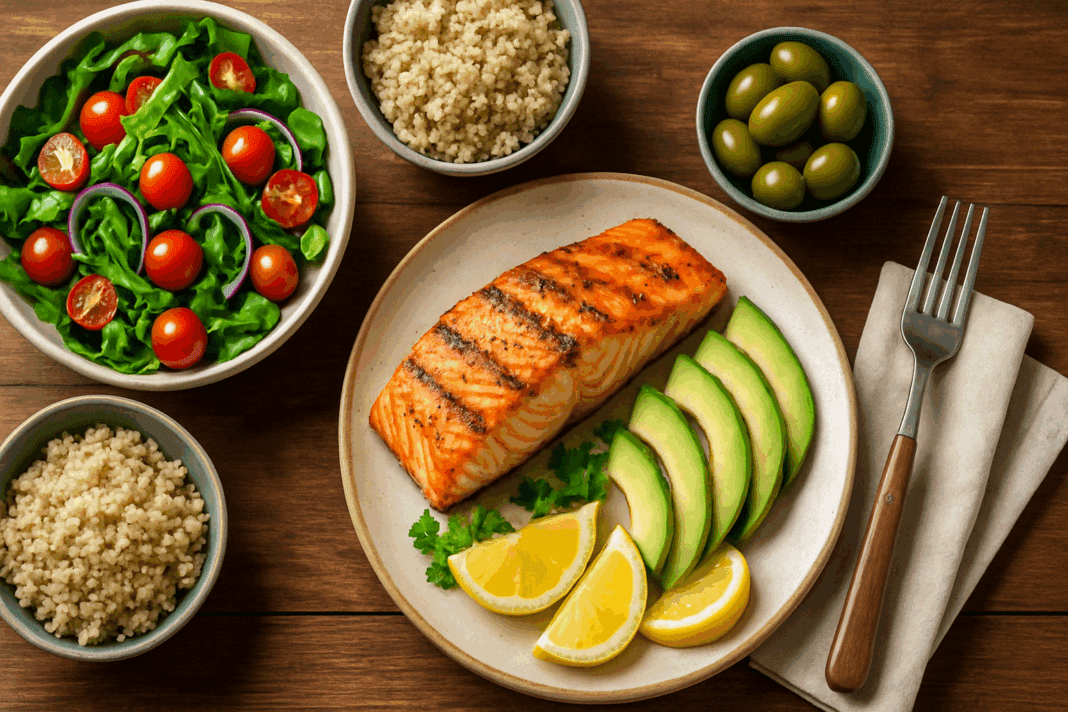The pescatarian diet—a flexible, largely plant-based eating pattern that incorporates seafood—has been gaining momentum as a middle-ground option between vegetarianism and omnivory. But is the pescatarian diet healthy, and how does it compare to other popular dietary approaches like the Mediterranean diet or even low-carb eating patterns like keto? To answer these questions, we must delve into the science of nutrition, investigate the core principles of what pescatarians actually eat, and explore the benefits and potential risks of this dietary lifestyle.
You may also like: Plant Based Diet vs Standard American Diet: What the Latest Studies Reveal About Long-Term Health Outcomes
Defining the Pescatarian Diet: What Do Pescatarians Eat?
Understanding what a pescatarian eats begins with recognizing that the foundation of this diet is primarily plant-based. Fruits, vegetables, whole grains, legumes, nuts, and seeds form the backbone of daily meals. What differentiates pescatarians from vegetarians is their inclusion of seafood—fish and shellfish—as a primary source of animal protein. Some pescatarians also consume dairy and eggs, although these choices vary individually. This leads many to ask, can pescatarians eat eggs? The answer is yes, many do, but it is not a universal rule.
So, what can pescatarians eat beyond fish and produce? The answer includes a rich array of whole-food options: seaweed, tofu, tempeh, lentils, avocados, olive oil, and fermented foods like miso or kimchi. For those wondering, “do pescatarians eat shrimp?”—yes, shellfish such as shrimp, mussels, and scallops are typically included. Those still asking, “does pescatarian eat eggs” or “can pescatarian eat eggs” will find that many pescatarians include them for additional protein and nutrients like vitamin B12 and choline.
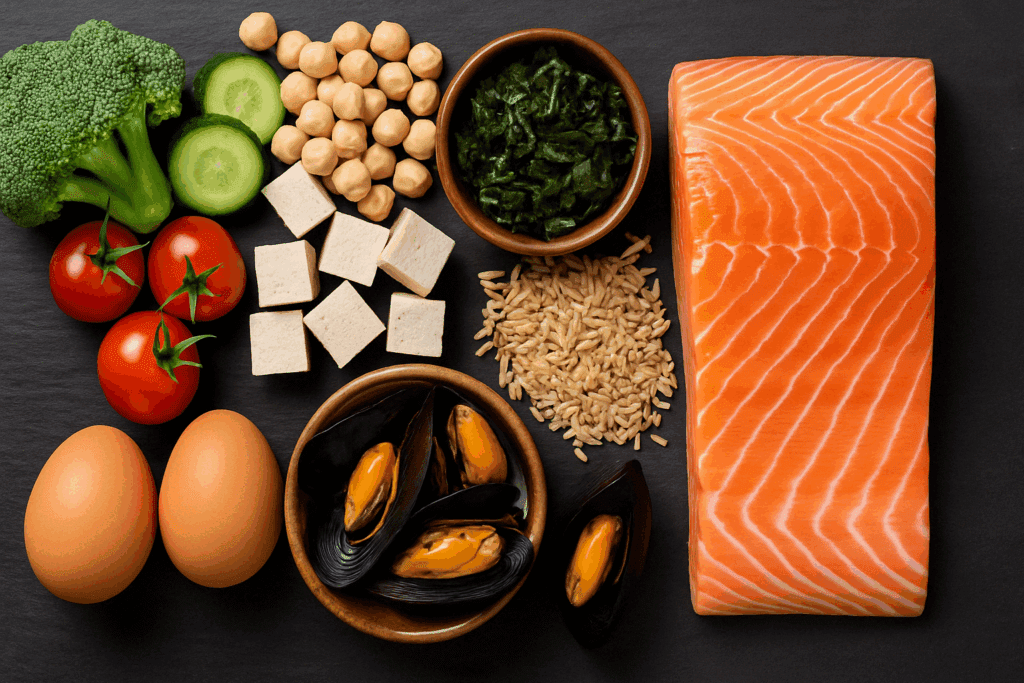
Clarifying Terminology: What Do You Call Someone Who Only Eats Fish?
There’s frequent confusion between terms like pescatarian, pesco-vegetarian, and semi-vegetarian. While all denote reduced meat consumption, a pescatarian strictly avoids land animals but eats fish. The phrase “what do you call a person who only eats fish?” is often answered with “pescatarian,” although the more technical term is “pesco-vegetarian.” Still, both terms are generally accepted.
Pescatarian Diet Benefits: Nutrition Backed by Science
The benefits of a pescetarian diet are supported by a growing body of evidence. One of the key advantages is cardiovascular health. Fish, particularly oily varieties like salmon, sardines, and mackerel, are rich in omega-3 fatty acids—essential fats known to reduce inflammation, support brain function, and lower triglyceride levels. Numerous studies have shown that regular fish consumption is associated with a lower risk of coronary artery disease.
From a nutritional standpoint, the pescatarian diet benefits include increased intake of vital nutrients like iodine, selenium, vitamin D, and high-quality protein from seafood. At the same time, pescatarians enjoy the fiber, antioxidants, and phytonutrients abundant in plant foods, making this diet well-rounded and nutrient-dense. In comparison to the Mediterranean diet, the pescatarian vs Mediterranean diet discussion often highlights that both encourage similar foods—whole grains, vegetables, legumes, and seafood—though the Mediterranean diet typically includes more poultry and red wine.
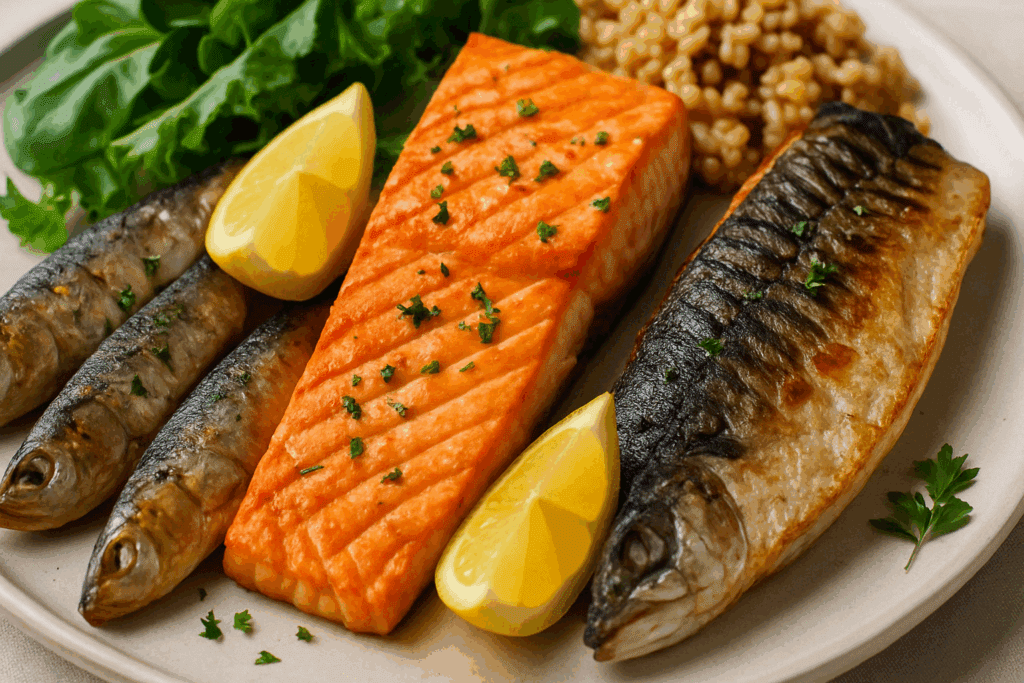
Pescatarian Diet and Weight Loss: Can It Help You Shed Pounds?
A common question is whether pescatarians lose weight more easily. In many cases, yes. The pescatarian diet and weight loss often go hand-in-hand, thanks to its emphasis on low-calorie, high-fiber plant foods combined with satiating, lean protein from fish. Research suggests that plant-forward diets are associated with healthier body mass indices (BMIs), and when seafood replaces processed or red meat, caloric density tends to drop.
This leads to inquiries such as “can pescetarian lose weight” or “pescaterian weight loss strategies.” Evidence suggests that individuals who transition from a standard Western diet to a pescatarian pattern tend to experience gradual, sustainable weight loss. For those specifically trying to lose weight pescatarian style, meals rich in vegetables, legumes, and grilled or baked fish—not fried—are key.
Comparing Diets: Keto, Low-Carb, and Pescatarian Approaches
As low-carbohydrate and ketogenic diets remain popular for weight management, it’s worth asking: is keto a low carb diet? Indeed, the ketogenic diet is a very low-carb, high-fat eating plan designed to put the body into a state of ketosis, where fat is used as the primary energy source. This raises additional questions about how the pescatarian diet compares.
When considering keto diet vs low carb diet principles, the primary difference is that keto restricts carbs to near elimination, while low-carb diets are more moderate in their approach. But how does this relate to pescatarian eating? While the standard pescatarian diet includes whole grains and legumes—foods that are typically restricted on keto—it can be modified to align with low-carb principles by focusing on non-starchy vegetables, nuts, seeds, eggs, and fatty fish.
This naturally prompts a comparison: is a keto diet sustainable, and is keto a good diet long-term? Critics of keto point to sustainability concerns, nutrient gaps, and social challenges. In contrast, the pescatarian diet, with its balance of plant and marine foods, is often praised for being easier to maintain over time. This contrast underscores the differences in the keto diet vs low carb diet debate and shows that a pescatarian approach may offer a more sustainable, nutrient-dense alternative.

Is Pescatarian Healthy for Everyone? Potential Risks and Considerations
Despite its many advantages, the question remains: is pescatarian healthy for all individuals? While generally beneficial, there are a few potential risks to be aware of. One concern is mercury exposure from seafood. Larger predatory fish like tuna, swordfish, and king mackerel can accumulate higher levels of mercury, posing risks especially for pregnant individuals and young children. Diversifying seafood choices and opting for low-mercury options like salmon, sardines, and trout can mitigate this risk.
Another issue is the environmental impact of overfishing and unsustainable aquaculture practices. Ethically-minded pescatarians may wish to seek out certified sustainable seafood and support local or small-scale fisheries. Furthermore, for those asking “do pescatarians eat chicken?”—the answer is no. True pescatarians do not consume poultry or other land animals, which may be an adjustment for those accustomed to omnivorous diets.
Also, individuals with allergies to seafood or shellfish must obviously avoid this diet, and those relying heavily on fish for protein should be aware of potential imbalances if their intake is not well-varied. Finally, while the pescatarian diet can be rich in protein and essential fatty acids, it may fall short in nutrients like iron or zinc if not planned carefully, especially in those who do not consume eggs or dairy.
What Does a Pescatarian Eat in a Typical Day?
Curious readers often ask: what does a pescatarian eat in a day? A balanced pescatarian day might begin with a breakfast of avocado toast on whole-grain bread with a poached egg, a lunch of mixed greens with lentils and grilled salmon, and a dinner of quinoa-stuffed bell peppers alongside sautéed spinach and shrimp. Snacks may include hummus with veggie sticks, a handful of almonds, or Greek yogurt with berries.
The key is diversity and balance—emphasizing fiber-rich, antioxidant-dense plant foods alongside clean, sustainable seafood. This model aligns well with whole-food plant-based nutrition principles, making it ideal for those seeking an anti-inflammatory, heart-healthy lifestyle that is also practical and satisfying.
Is Pesco Vegetarian Healthy in the Long Run?
When evaluating whether a pesco vegetarian is healthy long-term, the answer again leans positive. Epidemiological studies suggest that diets high in vegetables and fish are associated with lower all-cause mortality and reduced risk of chronic diseases such as type 2 diabetes, hypertension, and stroke. The pesco-vegetarian model, which excludes red and processed meats but includes seafood, provides a strategic balance of nutrition and disease prevention.
That said, ongoing nutritional vigilance is key. Regular monitoring of omega-3 intake, vitamin D levels, and potential nutrient gaps can help ensure optimal health outcomes. Integrating diverse plant foods, fortified products if needed, and low-mercury seafood options is essential for nutritional adequacy.
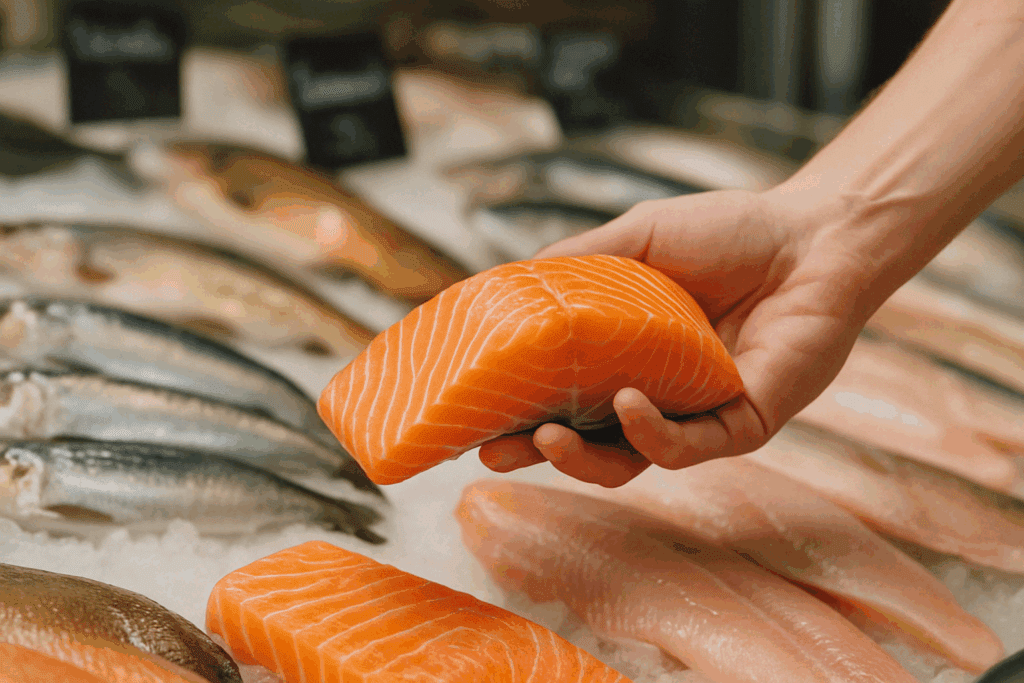
Frequently Asked Questions: Pescatarian and Whole Food Plant-Based Diets
1. How does a pescatarian diet support athletic performance and recovery?
While often overlooked in sports nutrition, the pescatarian diet provides a balanced approach to fueling the body for both endurance and strength activities. The combination of plant-based carbohydrates and omega-3-rich fish enhances glycogen replenishment and reduces post-exercise inflammation. Unlike traditional high-protein diets, a pescetarian diet supports muscle recovery without relying on red or processed meats, which may contribute to systemic inflammation. The benefits of pescetarian diet patterns extend to joint health, mental clarity, and consistent energy levels—factors critical to athletic success. Additionally, because it emphasizes whole foods, the pescatarian diet benefits include nutrient density without excessive saturated fat.
2. Can pescatarians eat eggs, and how do eggs fit into a balanced pescatarian lifestyle?
Yes, pescatarians can eat eggs if they choose to include them in their version of the diet, though it depends on individual preference and ethical considerations. The answer to “can pescatarian eat eggs” or “does pescatarian eat eggs” lies in the flexibility of this lifestyle. Eggs provide a rich source of choline, B12, and high-quality protein, which can complement the plant and seafood elements of the pescetarian diet. Including eggs can make the diet more accessible and easier to maintain for people transitioning from omnivorous habits. However, for those more aligned with a pesco vegetarian identity, limiting or avoiding eggs may align better with their personal health or environmental goals.
3. What are the psychological benefits of transitioning from a pescatarian diet to a fully plant-based diet?
One often underestimated benefit of adopting a more plant-centered lifestyle is the psychological uplift many individuals experience. While the pescatarian diet is healthy and can reduce guilt associated with conventional meat consumption, fully transitioning to a whole food plant-based diet often enhances emotional well-being. Individuals frequently report a stronger sense of alignment between their values and food choices, especially when the shift is driven by ethical or environmental motivations. The pescatarian vs Mediterranean diet comparison shows that both can support mood stability, but eliminating fish and dairy may further reduce exposure to inflammatory compounds that affect neurological health. This mental clarity and sense of empowerment often help people stay consistent in their eating patterns.
4. What do you call someone who only eats fish, and how is that different from being a pescatarian?
Someone who only eats fish as their primary source of animal protein, while avoiding other meats, is often referred to as a pescatarian. The phrases “what do you call someone who only eats fish” and “what do you call a person who only eats fish” are used interchangeably with the term pescatarian, although some differentiate based on whether dairy or eggs are included. In practice, the pescaterian diet is broader than just seafood—it typically includes legumes, vegetables, fruits, whole grains, and nuts. The more inclusive term allows for a diet rich in variety and phytonutrients, even as seafood remains a significant protein source. The key distinction lies in how strictly the individual adheres to limiting or excluding other animal-derived foods like eggs and dairy.
5. What are the long-term health trade-offs between a pescatarian diet and a whole food plant-based diet?
Both the pescetarian diet and whole food plant-based diet offer protective benefits against chronic disease, but they differ in their long-term health implications. The pescatarian diet benefits cardiovascular health due to omega-3 fatty acids from fish, yet mercury accumulation and overfishing concerns limit its long-term sustainability. In contrast, a WFPB diet eliminates animal-based risks while emphasizing anti-inflammatory and detox-supporting foods like cruciferous vegetables and legumes. One key pescatarian diet pros and cons debate centers on bioavailability of nutrients: while seafood provides readily absorbable B12 and iron, plant-based diets may require supplementation. However, long-term data show that whole plant diets tend to outperform pescetarian ones in reversing metabolic syndrome and improving gut diversity.
6. How can pescatarians optimize their diet for weight loss without compromising nutrition?
The pescatarian weight loss journey is often most successful when focused on unprocessed, fiber-rich plant foods paired with lean seafood. While it’s easy to rely on calorie-dense fish preparations, such as fried or breaded fillets, the healthiest pescatarian diet and weight loss outcomes come from grilled or baked fish with plenty of greens and legumes. To lose weight pescatarian-style without nutritional compromise, it’s important to prioritize meal diversity and reduce reliance on simple carbohydrates. Asking “what can a pescatarian eat” can inspire a more varied, colorful plate that includes seaweed, fermented foods, and pulses. This approach not only accelerates weight loss but also supports microbiome health and reduces cravings.
7. Do pescatarians eat shrimp, and how does shrimp compare nutritionally to other seafood?
Yes, many pescatarians eat shrimp as part of their seafood intake, though some avoid it due to sustainability concerns. From a nutritional standpoint, shrimp is low in calories and high in protein, selenium, and vitamin B12, making it a practical option within the pescetarian diet. Compared to fattier fish like salmon, shrimp contains less omega-3, but it’s also lower in saturated fat. The question “do pescatarians eat shrimp” can open the door to deeper reflection about sourcing: farm-raised vs wild-caught and regional harvesting practices. While shrimp can certainly be part of a healthful pescatarian or pescetarian diet, diversifying seafood choices ensures broader nutrient coverage and limits potential toxin exposure.
8. How does the fish and greens diet fit within a modern, nutrient-conscious pescatarian framework?
The fish and greens diet—a simplified model of the pescatarian lifestyle—embodies a minimalistic, nutrient-dense eating pattern. Its appeal lies in its anti-inflammatory properties and ease of meal preparation, but relying solely on fish and leafy vegetables may result in micronutrient gaps over time. Incorporating nuts, legumes, root vegetables, and sea-based foods like algae can significantly enhance the benefits of pescetarian diet plans built on this foundation. To fully understand “what can pescatarians eat” beyond the basics, it helps to explore culinary traditions from Mediterranean, Japanese, and coastal Indian cuisines. These offer culturally rich and nutritionally robust interpretations of pescatarian eating that move well beyond grilled salmon and spinach.
9. Can you eat fish on a vegetarian diet, and what are the ethical implications?
Strict vegetarians do not eat fish; however, many people mistakenly believe that including seafood still aligns with vegetarian principles. So when asked, “can you eat fish on a vegetarian diet?”, the accurate answer is no—doing so categorizes the person as a pescatarian, not a vegetarian. This distinction matters both nutritionally and ethically. While the pescatarian diet offers flexibility, ethical vegetarians avoid fish due to concerns about animal welfare, bycatch, and environmental degradation. For individuals grappling with whether the pescetarian benefits justify this compromise, understanding the impact of commercial fishing practices may inform their choices. Still, a pescaterian diet can serve as a transitional model toward more ethically aligned eating.
10. How does the pescatarian vs Mediterranean diet comparison inform choices for heart health?
The pescatarian vs Mediterranean diet conversation often reveals more similarities than differences—both prioritize plant foods, whole grains, and healthy fats. However, the Mediterranean diet typically includes more olive oil, cheese, and occasional poultry, whereas a pescatarian diet tends to minimize dairy and exclude chicken altogether. This leads many to ask, “do pescatarians eat chicken?”—the answer is no, as that would place them outside the pescetarian definition. Nutritionally, the Mediterranean diet may offer more variety in flavor profiles, but the pescatarian model may result in lower saturated fat intake overall. For those targeting heart health, either diet can be effective, but eliminating processed oils and cheese, as seen in stricter pescaterian weight loss approaches, may yield better lipid profiles over time.
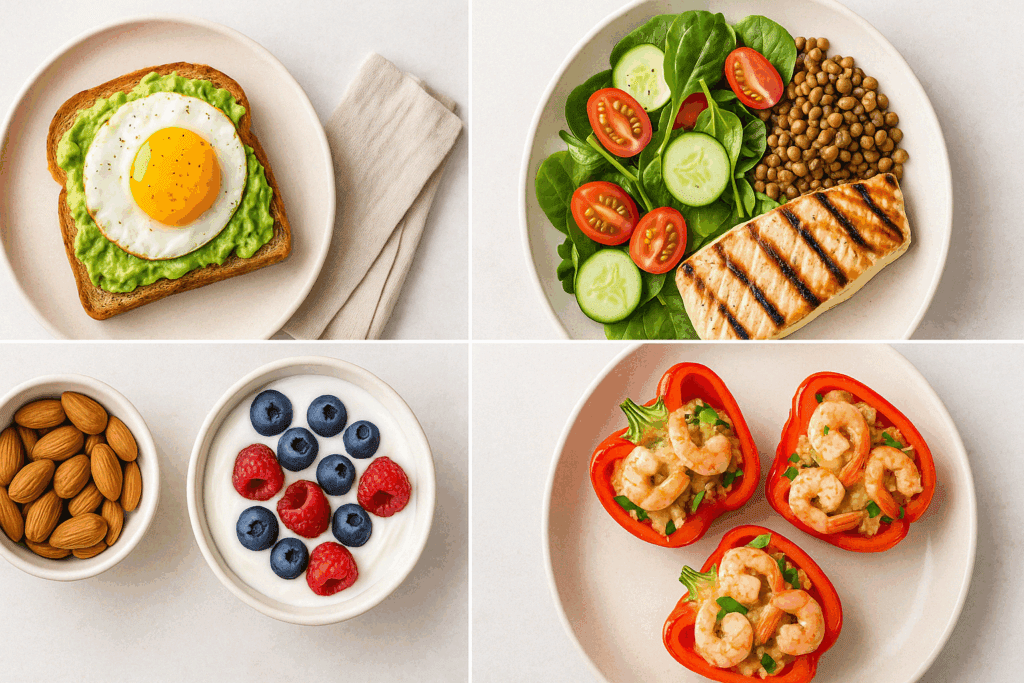
Conclusion: Should You Consider a Pescatarian Diet for Health and Weight Management?
Ultimately, is the pescatarian diet healthy? The answer is a resounding yes—for many individuals. When implemented thoughtfully, the pescatarian diet benefits include improved heart health, sustainable weight loss, and enhanced nutritional diversity. By balancing plant-based eating with the inclusion of nutrient-rich seafood, this diet aligns with the best aspects of both vegetarian and Mediterranean models.
For those evaluating dietary patterns, comparing pescatarian vs Mediterranean diet philosophies reveals strong similarities, though the pescatarian diet may place even more emphasis on fish and less on poultry. Likewise, while keto and low-carb diets appeal for their weight loss potential, the pescatarian model offers a more sustainable, whole-food approach that can be adapted for moderate carb restriction without sacrificing nutritional balance.
Whether you’re trying to lose weight pescatarian style or simply aiming to support long-term wellness, this dietary approach offers a compelling, evidence-backed path forward. And while questions like “what do pescatarians eat,” “can pescatarians eat eggs,” or “what can a pescatarian eat” may seem simple, they open the door to a thoughtful, nutrient-dense way of eating that respects both health and sustainability.
In an age of dietary confusion, the pescatarian diet stands out as a flexible, whole-food approach rooted in scientific evidence. It bridges the best of plant-based and seafood nutrition, offering both practicality and health benefits that can serve as a long-term foundation for vibrant living.
Was this article helpful? Don’t let it stop with you. Share it right now with someone who needs to see it—whether it’s a friend, a colleague, or your whole network. And if staying ahead on this topic matters to you, subscribe to this publication for the most up-to-date information. You’ll get the latest insights delivered straight to you—no searching, no missing out.
Further Reading:
Thinking about becoming a pescatarian? What you should know about the pescatarian diet
Disclaimer
The information contained in this article is provided for general informational purposes only and is not intended to serve as medical, legal, or professional advice. While NewsHealthWatch strives to present accurate, up-to-date, and reliable content, no warranty or guarantee, expressed or implied, is made regarding the completeness, accuracy, or adequacy of the information provided. Readers are strongly advised to seek the guidance of a qualified healthcare provider or other relevant professionals before acting on any information contained in this article. NewsHealthWatch, its authors, editors, and contributors expressly disclaim any liability for any damages, losses, or consequences arising directly or indirectly from the use, interpretation, or reliance on any information presented herein. The views and opinions expressed in this article are those of the author(s) and do not necessarily reflect the official policies or positions of NewsHealthWatch.

